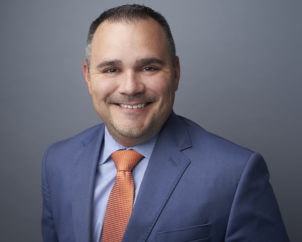Out of all the things that have changed in the U.S. due to COVID-19, the closure of schools has probably been one of the most far reaching. In addition to colleges closing and our chapters learning to adapt to a new environment, almost overnight, administrators and teachers had to develop new methods and strategies for helping the millions of K-12 students across the country learn from home, oftentimes while trying to help their own children adjust as well.
Now that a new school year has begun, these educators are employing lessons learned from the earlier nationwide school shutdown as some return to teaching in their classrooms and others continue instructing their students remotely. Here, in their own words, several SigEp educators share their experiences navigating the challenges of teaching during a pandemic.
E.J. Dubinsky, Valparaiso ’18
How long have you been teaching?
This will be my second year teaching eighth grade math at Citizens Leadership Academy in Cleveland, Ohio, and my third year teaching.
Will you be teaching virtually, in person or a combination of the two this year?
Our school will be starting the year virtually with plans to go back [to the classroom], depending on the state of the pandemic throughout the fall.
 What has been most challenging about teaching during the pandemic?
What has been most challenging about teaching during the pandemic?
The obvious technical issues and planning aside, the most difficult part is not actually being there with the students and my coworkers. For me, the largest joy in teaching is developing relationships and watching the students’ progress as thinkers and people in real time. Not only are we not getting as much time with them, but the extent of our interactions happen on a screen where they spend most of their day on “mute” in Zoom. We still have lots of fun and get lots of learning done, but I can’t wait to be back in the building with the scholars and my fellow teachers again.
What strategies did you use to help yourself adapt to teaching online?
The biggest key to successful online learning is being adaptive to the students and your own needs. And just like every teacher has their own teaching style, the style of the online tools is going to be different. Resources like Wizer.me and Nearpod make math lessons more interactive than Google forms or slides, but there are a million creative ways to get the material in front of students.
I think, more importantly, I’ve tried to model my live classes on the Twitch streamers and youtubers my kids already spend time watching. Making the interactions with chat frequent, keeping an upbeat and fast paced tone, and designing activities so that they’re similar to the ones in my classroom … FUN!
Michael Mellott, Eastern Illinois ’96
How long have you been teaching music/serving as a choir director?
The 2020-2021 school year marks the start of my 23rd year of teaching K-12 general and choral music. Currently, I teach seventh and eighth grade middle school chorus and general music at Charleston Middle School in Charleston, Illinois.
Will you be teaching virtually, in person, or a combination of the two this year?
For the first quarter of the school year, we are 99.9% remote learning, and we will evaluate at the end of the quarter to reconsider face-to-face schooling. 
What has been most challenging about leading a choir during the pandemic?
I would say the most challenging aspect during this time is the lack of social interaction. The bottom line is the kids miss their friends (and their teachers). Relationships and culture norms are created at school, and being separated for months has put emotional stress on both children and their families.
Programs such as choir not only teach students how to sing, read music and perform, but also provide an emotional outlet. An online choir may be fulfilling the music aspect of their education, but it is what is happening outside of the classroom that is really working. For example, after our online rehearsals, I have a large number of students sticking around wanting to talk. I sometimes stay on for another half hour or longer to listen. This may be helping students more than anything else right now.
No matter what role we play in education, how does one successfully juggle the art of building character, confidence and self-efficacy in students … through a computer screen?
One of the greatest joys of teaching music is watching kids crawl out of their shells and grow into confident young adults. You could say that I don’t really teach music, but I use music to teach students to better themselves. This philosophy of education is challenging enough when teaching face-to-face, and even more so with remote learning. Tasking our students to grow academically and emotionally through virtual learning will be one of our greatest challenges.
What strategies did you use to help yourself adapt to working with students online?
The real secret is using the connections with colleagues and creating a syngeneic approach to see what programs, software and techniques work for students. I’m lucky to have an incredible music staff that collaborate to find solutions to teaching music remotely.
Anthony Balboa, Florida International ’02
How long have you been teaching/serving as an assistant principal?
I began teaching at South Miami Senior High School in May of 2002 after completing my internship at the same school and graduating from Florida International University. I served as a teacher, school assessment coordinator, head swim coach and assistant varsity basketball coach. After getting my master’s in educational leadership, I was lucky enough to become an assistant principal at the same school five years ago. Counting my internship, I have been at South Miami Senior High School a total of 18 and a half years.
 Will your school be online, in person, or a combination of the two this school year?
Will your school be online, in person, or a combination of the two this school year?
This school year, Miami Dade County Public Schools, the fourth largest school district in the nation, decided to begin virtually with hopes of returning partially once the COVID-19 positivity rate is at or below 5%. The current plan is to re-evaluate in hopes of moving to phase II in October. Prior to the start of the school year, students had the option to choose whether to work virtually or attend school in person once we reopen.
What has been most challenging about serving as a school administrator during the pandemic?
Ensuring students remain engaged and interested in their studies has been challenging. High school students look forward to the activities, games, events, prom, senior trips and graduation that were cancelled or took place virtually this year. Many of our students had to work or get jobs in order to help their families during the pandemic, which made balancing academics and home life very challenging.
We were very concerned about our seniors and our graduation rate that had increased yearly since I became assistant principal. I am blessed to work with an outstanding group of dedicated educators on a daily basis. Thanks to working with our other administrators, amazing teachers, counselors, parents and students, we were able to attain our highest graduation rate in school history.
What strategies did you use to adapt to managing all of your interactions with staff, students and parents virtually?
Honestly, I put our SigEp creed into action: Virtue, Diligence and Brotherly Love. It was not easy, and I diligently worked with my peers to do what was best for our students to ensure their academic success. We implemented effective communication, making sure all outlets, including our school website, social media and any other communication were clear, open and honest. Stakeholders stayed involved and were aware of what was going on, how instruction would take place and how we could make the best out of the situation. We had virtual class meetings, virtual parent conferences and took time to connect. Most importantly, we practiced brotherly love, being there for one another as much as we could. Since our school has an outstanding culture and powerful student voice, our faculty and school community came together to practice patience and understanding.
SigEp remains thankful for these brothers and the many others across the country whose passion to teach has not wavered in these unique times. In the true SigEp spirit of service, they continue to educate, mentor and inspire.









Leave a Reply